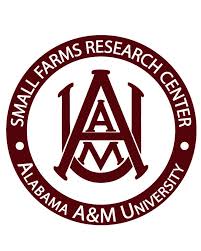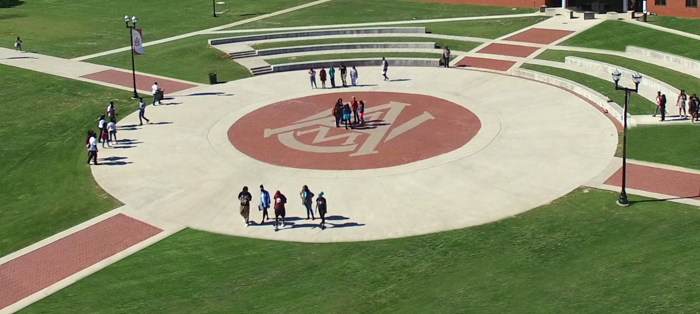About the Center

The concept of a Center at AAMU devoted to studying small farms issues and their impact on the survival of these farms and ranches was first conceived in 2000 with funding from USDA's National Office of Outreach under Section 2501 of the 1990 Farm Bill (a.k.a. Outreach Assistance for Socially Disadvantaged Farmers and Ranchers (OASDFR) Program). The 2501 project at AAMU received its first funding in 1994. The overall goal of AAMU’s OASDFR project at that time was narrow and restricted to the provision of technical assistance and training in record keeping, and delivery of production and marketing information to farmers and ranchers not reached by the traditional cooperative extension machinery or programs. The clientele in this category usually operate small-scale, family-owned or managed farms, often with limited resources. The project's service area included only twelve counties in north Alabama.
As project staff and faculty grew in numbers and became diverse, and activities more complex and/or holistic in nature, the need for a Center devoted to small farms research, education and outreach became increasingly inevitable. Thus, the Small Farms Research Center was initiated in 2000 to provide services throughout Alabama, with special and particular emphasis on twenty-one (21) underserved counties in north Alabama. The Center is an integral part and sole outreach arm and vehicle of the College of Agricultural, Life and Natural Sciences (CALNS). It is housed in Room 219 of the James I. Dawson Cooperative Extension Building on AAMU campus. The Center caters and responds directly to the needs of small, limited resource, new and beginning farmers and ranchers, rural entrepreneurs, researchers, organizations, agribusiness management specialists, extension personnel, and consumers by providing research results, publications, outreach, and educational programs on small farms and business development topics. The Center is multi-faceted with increasingly diverse functions including, but not limited to, the following:
- Serving as a clearinghouse for questions from small, limited resource, new and beginning farmers and ranchers, entrepreneurs, land owners, farm/agribusiness management specialists, extension personnel, government officials and agencies, and the academic community;
- Conducting socio-economic research and evaluating issues and factors that might directly impact the profitability of limited resource farms and rural businesses, enhance economic development, and promote viability and overall sustainability of local communities;
- Maintaining agricultural policy analysis capability in order to examine and analyze alternative policies and external factors for implications on Alabama’s production, utilization, farm and retail prices, farm income, trade, and government costs;
- Determining effective risk management tools for crop and livestock producers in the state of Alabama, and analyzing how government policy affects risk management strategies;
- Establishing and maintaining an online or web-based resource center for new and beginning farmers and ranchers and other minority and socially disadvantaged agricultural producers and rural entrepreneurs in Alabama’s underserved communities to facilitate overall training; development, implementation and advancement of producer programs; and for timely and effective dissemination of educational and resource materials to the target audience;
- Developing and maintaining a farm incubator education and training program and strengthening its activities through field days, farmer-to-farmer training, on-farm demonstrations, mentoring, online or web-based training, and certification programs;
- Publishing research findings, manuals, fact sheets, proceedings, pamphlets, leaflets, and a quarterly newsletter, News Update, that include news of upcoming events, publications, topical issues, and profiles of outstanding and exemplary small and beginning farmers and ranchers, rural entrepreneurs, extension personnel and key local community leaders;
- Sponsoring, conducting, distributing, and promoting information about on-farm research, sustainable practices, and marketing strategies for small, limited resource, new and beginning farmers and ranchers, and rural businesses and agribusinesses;
- Organizing farm-based events and learning opportunities that promote and educate local agricultural producers, rural entrepreneurs and community members;
- Fostering a connection between area farmers, landowners, entrepreneurs and community members that establishes and promotes communication about local agricultural concerns;
- Organizing and coordinating local, regional and statewide conferences, meetings, training workshops, and symposiums, and supporting extension personnel, farm management specialists, farmers markets and farm organizations in regional and local programs;
- Providing opportunity for local limited resource, new and beginning farmers and ranchers, and rural entrepreneurs to socially, educationally and philosophically interact;
- Providing and promoting educational opportunities that empower women and advance their interests and welfare regarding important issues affecting or surrounding agriculture;
- Maintaining a viable and effective entrepreneurship education program to prepare people, particularly youth, to be responsible, enterprising individuals who become entrepreneurs or entrepreneurial thinkers by immersing them in real life learning experiences where they can take risks, manage the results, and learn from the outcomes;
- Providing targeted and carefully tailored needs-based and hands-on practical training and experience to willing graduate and undergraduate students through internships, bi-weekly student employment, and graduate assistantships; and
- Providing leadership and coordination for the USDA’s Outreach Assistance for Socially
Disadvantaged Farmers and Ranchers Program (OASDFR) Program, USDA’s Beginning Farmers
and Ranchers Program (BFRDP), and other projects within the Center.
Primary Target Counties
The Center primarily serves the following twenty-one counties in northern and north-central Alabama: Blount, Calhoun, Cherokee, Cleburne, Colbert, Cullman, DeKalb, Etowah, Fayette, Franklin, Jackson, Lamar, Lauderdale, Lawrence, Limestone, Madison, Marion, Marshall, Morgan, St. Clair, and Walker Counties.
Primary Service Areas
All community outreach and cooperative extension functions within the Center operate in the context of five distinct units or divisions:
- Research and Policy Analysis Unit
- Risk Management Education and Community Outreach Unit
- Rural Entrepreneurial Outreach and Business Development Initiative
- Food Safety Education, and
- Technology (Computer Training) Outreach Unit
Even though all the units function together as one unit, each of these units has separately been funded over the years. Since 1996, over $12.94 million in grants and agreements has been invested in the operation of the small farm outreach within the College of Agricultural, Life, and Natural Sciences. The overall aim has been to conduct outreach training and provide technical assistance and advice to minorities and underserved producers, land owners, businesses and entrepreneurs throughout the state of Alabama.
Research and Agricultural Policy Analysis
An agricultural policy analysis capability exists within the Center whose function it is to examine the impacts of alternative policy changes on state agricultural economy. The modeling system is funded by USDA/NIFA, and it comprises an econometric model, an impact analysis policy simulation model (IMPLAN), a farm-level policy analysis simulation model (FLIPSIM) and an environmental impact simulation model (EPIC). These models are interactively used to simulate the impacts of changes in a policy or market conditions on different sectors of the state's agricultural economy. This information is used for policy decisions and evaluation. The information is also shared with farmers and ranchers and entrepreneurs to allow them better manage their farms and business operations. In summary, this unit acts in a supportive role to all the other units. Through fact sheets, flyers and other research publications, it provides research-based information to producers and entrepreneurs.
Risk Management Education and Community Outreach Unit
This component of the outreach program is funded by USDA/National Institute of Food and Agriculture’s (NIFA) Beginning Farmers and Rancher Development Program (BFRDP), USDA/Office of Advocacy and Outreach’s (OAO) Outreach Assistance for Socially Disadvantaged Farmers and Ranchers (OASDFR) Program, and USDA/Risk Management Agency. Our efforts involve conducting community outreach and providing technical assistance and risk management education to all producers in the state of Alabama with a special focus on minorities, new and beginning farmers and ranchers, socially disadvantaged agricultural producers, land owners and rural entrepreneurs. The outreach or extension efforts target specific priority areas which maximize the program's benefits per unit dollar invested. The operation of the outreach/extension programs is based on a new synergy derived from mutually beneficial partnerships that have so far evolved over time. The outreach and risk management program blends unique approaches to outreach, develops training materials and resources, and identifies key strategies to manage risk, enhance farm profitability and promote overall sustainability. The activities of this unit and others typically prepare producers to be able to identify the various risk/farm management tools available and know where to obtain them, understand how each tool operates, and be able to select one that best meets their individual need. The unit and the Center operate in close collaboration with partners including, but not limited to, Alabama Cooperative Extension System, Alabama Sustainable Agriculture Network, Federation of Southern Cooperatives, federal agencies, universities, etc.
Rural Entrepreneurial Outreach and Business Development Initiative
This portion of the Center's outreach activities is funded by USDA/Rural Development through a partnership agreement. The Center's zeal and desire to initiate a rural business and entrepreneurship program arose out of the realization that Alabama is a classic example of the nation's most rural states and economic restructuring across the nation has affected it in ways that are significantly different from the experiences of other rural and urbanized regions. The state's economy continues to lag behind national averages on most economic measures. Recent research points out the special needs of small businesses in most rural areas:
a. few small rural entrepreneurs have a good objective picture of the financial condition of their businesses;
b. the managerial sophistication of small rural business people varies considerably among firms; and
c. "there is a critical need to develop a financial management information system that is relevant to small businesses and useful for outreach training."
The pool of business skills (including management, finance, and marketing) among small rural business entrepreneurs is clearly expandable through educational programs. Furthermore, the incidence and success of entrepreneurial activities could also be influenced through appropriate outreach and/or cooperative extension programs. This outreach program has been conceived to address some of the aforementioned problems faced by rural entrepreneurs and businesses in Alabama.
Food Safety Education Unit
The major focus in this area is educating farmers and consumers about food-borne illnesses and diseases and how these illnesses can be prevented. One grant from USDA/NIFA and a cooperative agreement from USDA/Food Safety Inspection Service have been used to provide food safety education to underserved communities in Alabama. The goal is to have an informed society about food safety issues. One important truth or fact from these outreach or educational activities is that the public is hungry for knowledge and is craving for information about food safety and other issues including the safety of genetically modified products.
Technology (Computer Training) Outreach Unit
This is an area that is currently being pursued vigorously. The aim is to educate producers about the use of technology or computers for record keeping, financial analysis and online trading. One useful approach that has yielded limited but remarkable success is the inter-generational computer use or technology training. It involves the old and the young working together on how to use computers or technology. Young adults are able to teach older folks how to use computers. At the same time, young folks are able to learn the art of farming from older folks. Sweet successes have been achieved and the Small Farms Research Center continues to invest in this approach for many of the producers in Alabama who have expressed the need and/or interest.
Conclusion
This is just a synopsis or brief description of the Center's outreach program within the College of Agricultural, Life and Natural Sciences. It is by no means exhaustive, but it highlights significant aspects of the outreach activities undertaken by the Center over the years. As the various activities and objectives of the outreach program are implemented, a holistic approach to outreach training and technical assistance is adopted. The program's success owes a lot to the close collaborative relationships that the Center enjoys with many organizations, federal agencies and the community AAMU serves.
Selected Impacts of Outreach Program
- AAMU remains visible and engaged in the community, an important aspect and mission for a land grant institution;
- Most small and limited resource farmers and ranchers in North Alabama have increased their farm income by 7.84%, on average since 2010;
- Developed and distributed numerous factsheets, flyers, brochures and modules;
- The materials have enhanced ranchers'/farmers' awareness of programs, benefits, and services available to them through USDA and other federal agencies;
- We have developed and translated fact sheets into the Spanish language to effectively reach out to the Hispanic communities in Alabama;
- More farmers and ranchers are adopting new technologies, production practices, and maintain improved record keeping systems;
- The number of farmers and ranchers adopting good farm business skills as a result of effective farm management training is on the rise;
- Outreach services have helped reduce loan delinquency rates;
- An 88% success rate in loan application approval has been recorded as a result of the assistance received by limited resource individuals, new and beginning farmers, ranchers and small rural businesses from this outreach Center;
- Rural entrepreneurs, agribusinesses and businesses have been assisted with grant writing and application which has resulted in over $450,000 approved under USDA's Rural Development Value-Added Producer Grants Program;
- Through MOU, the Echota Cherokee Indian Tribe of about 30,000 is receiving outreach training and technical assistance from AAMU through the Small Farms Research Center;
- A significant number of new and beginning farmers have received assistance from the
project and secured loans from commercial lenders and from USDA/Farms Service Agency.
Overall, the outreach program at AAMU has been more than successful. A number of small, limited-resource, new and beginning, and socially disadvantaged farmers and ranchers have benefited from the Center’s many projects and activities. Many more are now aware of the many USDA programs and services. We continue to disseminate information to all participants through newsletters, fact sheets, flyers, group meetings and annual conferences. Many small businesses in underserved communities are receiving assistance from this Center’s outreach programs. More importantly, the outreach has helped producers increase profitability of their farms, ranches and businesses. The Center and its programs has allowed AAMU to remain engaged in and connected to the community and clientele the University is supposed to serve.
For more information about the Center, please follow the links or call us at 1-866-858-4970 or at 1-256-372-4970. You may also reach us by email at smallfarmscenter@aamu.edu. The Center Director, Dr. Duncan M. Chembezi, may be contacted directly at duncan.chembezi@aamu.edu; the Program Manager and Assistant Director, Ms. E'licia L. Chaverest, may be reached by email at elicia.chaverest@aamu.edu.

 Skip to content
Skip to content